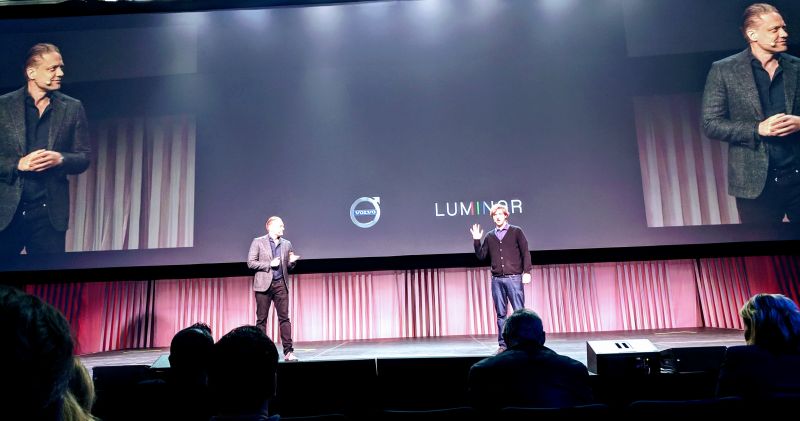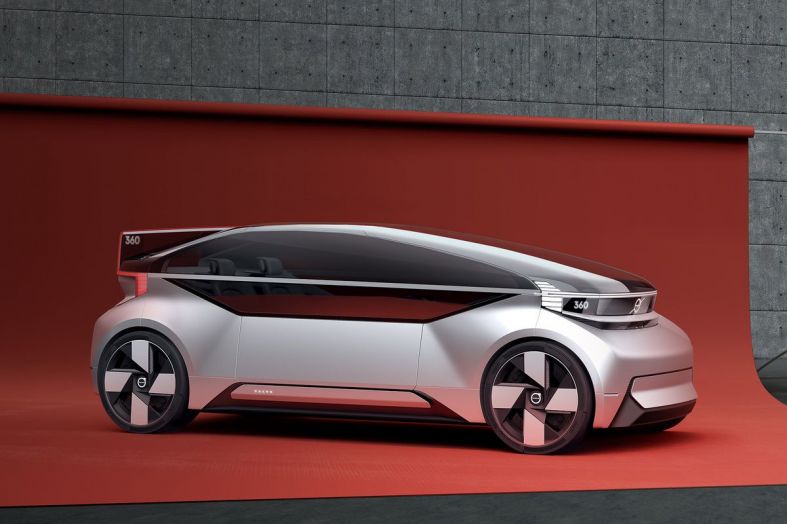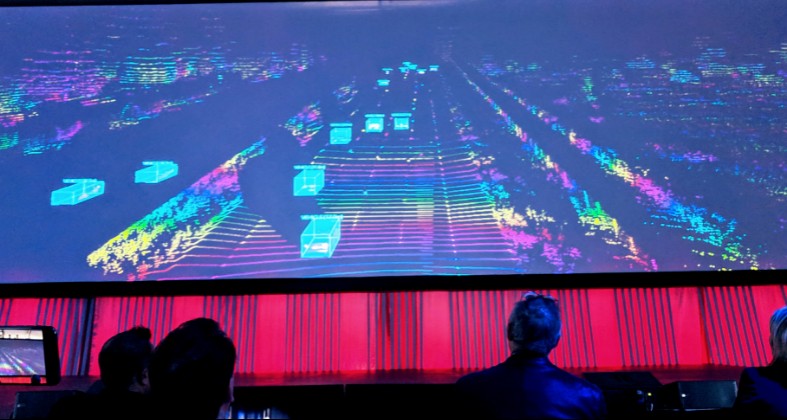Luminar & Volvo Share Details of Advanced LiDAR for Autonomous Driving at Automobility LA
【Summary】Today at the kickoff of AutoMobility LA in Los Angeles, Austin Russell, the founder of lidar startup Luminar and Henrik Green, VP of Research and Development at Volvo Cars, revealed advancements in lidar perception capabilities that are accelerating the development of Volvo’s R&D efforts.

Today at the kickoff of AutoMobility LA in Los Angeles, Austin Russell, the founder of lidar startup Luminar and Henrik Green, VP of Research and Development at Volvo Cars, revealed advancements in lidar perception capabilities that are accelerating the development of Volvo's R&D efforts. Together the companies are working towards a shared vision of safe, fully autonomous driving using lidar technology provided by Luminar.
Volvo is the first of Luminar's partners to fully develop this capability, which Russell and Green demonstrated on stage. The Luminar team has worked closely with Volvo Cars R&D to create advanced perception technologies. Lidar acts as the "eyes" of a self-driving vehicle, enabling a 3D view of the surrounding environment.
In June, the companies first announced their partnership, which included a significant investment in Luminar from the recently established Volvo Cars Tech Fund. Since then, Volvo Cars has introduced its vision for full autonomy with its 360c concept vehicle.
The demonstration this morning in Los Angeles gave the first look into long-range lidar perception capabilities on a live drive along busy Los Angeles freeways and streets to show off Volvo's long-range vision at highway speeds using Luminar's lidar-based sensing platform.
"The Volvo Cars R&D team is moving at an impressive pace to solve some of the most advanced problems in the development of autonomous driving," said Luminar founder and chief executive officer, Austin Russell. "As we've scaled up, they've remained on the forefront of developing an autonomous system to take the driver out of the loop - ultimately enabling deployment in real consumer vehicles."
Long-range perception is key to achieving Volvo Cars' vision for its upcoming 360c. Volvo said that Luminar's high performance lidar finally delivers the range, resolution, and fidelity the automaker requires to achieve safer-than-human understanding of a vehicle's surroundings.

Volvo's 360 Concept Vehicle
Lidar, which is short for "light detection and ranging", bounces laser beams off objects to provide a 3D representation of a vehicle's surroundings. The technology is considered an essential sensor for self-driving cars. Luminar says its advanced lidar is better than its rivals, offering higher detail and a longer range.
Luminar's lidar has a range of 250 meters Russell said. Typical lidar technologies can only see about half that. This longer range means Volvo's future autonomous vehicles will have more time to react safely, even at highway speeds.

Luminar's lidar shows cars on the road ahead which are labeled with blue boxes using computer vision software
The high resolution offered by Luminar's lidar technology enabled the Volvo Cars R&D team to achieve and demonstrate the first ever LiDAR-based pose estimation for autonomous driving. Pose estimation is used to understand and predict pedestrian body language, behavior and intention, but has traditionally only been achieved with 2D data from cameras.
The pose estimation can is used to determine what a pedestrian might do based on their body position, such as crossing the street. The lidar can show what direction a person is facing, and can even detect subtle details, such as a person's limp.
With LiDAR that achieves camera-like resolution in 3D, this is one of many perception & prediction challenges that can now be reliably solved.
"Autonomous technology will take driving safely to a new level, beyond human limitations. This promise to improve safety is why Volvo Cars wants to be a leader in autonomous drive. Ultimately, the technology will also create new benefits for our customers and society as a whole," said Green. "Luminar shares our ambition in making those benefits a reality and this new perception technology is an important next step in that process."
Green said Volvo plans to have a fully autonomous vehicle using Luminar's advanced lidar technology available sometime after 2021.
-


Ford is Testing a New Robotic Charging Station to Assist Drivers of EVs With Disabilities
-


Ford Raises the Prices of the F-150 Lightning Electric Pickup Due to Rising Raw Material Costs
-


The BMW 7-Series to Feature HD Live Maps From HERE Technologies for Hands-Free Highway Driving in North America at Speeds up to 80 MPH
-


AutoX to Use the 'Eyeonic Vision Sensor' from California-based SiLC Technologies for its Robotaxi Fleet in China
-


LG Develops ‘Invisible’ Speaker Sound Technology That Could Revolutionize In-Vehicle Audio
-


Researchers at South Korea’s Chung-Ang University Develop a ‘Meta-Reinforcement’ Machine Learning Algorithm for Traffic Lights to Improve Vehicle Throughput
-


Zeekr’s New 009 Electric Passenger Van is the World’s First EV to Feature CATL’s Advanced ‘Qilin’ Battery With a Range of 510 Miles
-


Redwood Materials is Building an Electric Vehicle Battery Recycling Facility in South Carolina
- General Motors is Building a Coast-to-Coast DC Fast EV Charging Network in the U.S. in a New Partnership with Travel Center Operator Pilot Company
- Ford Looks to Have 100% of EV Sales Be Online
- Polestar Shares the First Image of the Polestar 3 Electric SUV Ahead of its October Debut
- Rivian to Install Electric Vehicle Chargers in Michigan State Parks as Part of a New Partnership
- Tesla May Build its Next Factory in South Korea, According to the Country’s Presidential Office
- Volkswagen Announces Pricing and Styling Updates for the 2023 ID.4 Electric SUV, Which is Being Assembled in Tennessee
- The Tesla Model Y and Model 3 Take the 1st and 2nd Place Spots in the Annual Cars.com ‘American-Made Index’
- The World’s First Level-4 Automated Parking Feature Developed by Mercedes-Benz and Bosch is Approved for Commercial Use
- General Motors Announces a Key North American Nickel Supply Deal for Electric Vehicle Batteries
- Tesla’s Battery Supplier Panasonic is Close to Selecting the Site of its New U.S. Battery Plant











 About Us
About Us Contact Us
Contact Us Careers
Careers